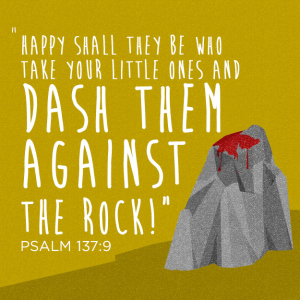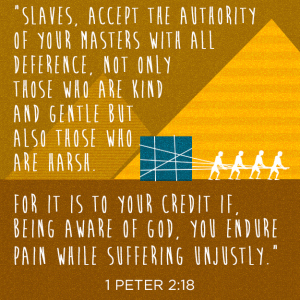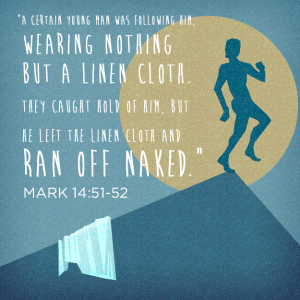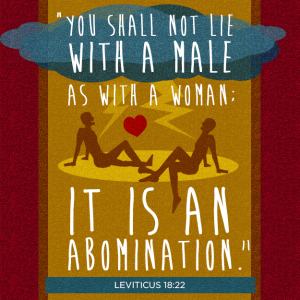Shocking Bible Verses

7 Shocking Bible Verses You Probably Won’t Hear In Church
God-commissioned bear attacks, praise of infanticide, and cannibalism? Yep, all in there. Re-posted from BuzzFeed.

Most people know “Love is patient, love is kind” and “The Lord is my shepherd; I shall not want.” But here are some, uh, less celebrated verses from the Bible (and how some people have tried to defend them):
Historical context: The writer has been exiled from Babylon. The Hebrew here is mournful; this psalm is often set to music.
What more conservative readers might say: It’s a metaphor wherein the babies are “the sadness of the Babylonian exile” who should be “dashed against the rock of faith,” or “dashing your sins against the rock of reason.”
What more liberal readers might say: Noted Hebrew Bible scholar Robert Alterwrites, “No moral justification can be offered for this notorious concluding line. All one can do is to recall the background of outraged feeling that triggers the conclusion.”
NB: The terms “liberal” and “conservative” here are used theologically, and used throughout as broad, non-exclusive simplifications, as the nuances of centuries of biblical interpretation are impossible to fully explicate here.
In general, “conservative” is used throughout to denote a more traditional approach that treats the biblical text with some measure of divine inspiration, whereas a “liberal” perspective might be more interested in a historical-critical approach that views the text as a document, or literarily.
Historical context: The vast majority of scholars believe that despite tradition, 1 Timothy wasn’t actually written by the apostle Paul. But in the letter, “Paul” writes to Timothy, who’s now pastoring a church at Ephesus, giving him instructions for running the place. The chapter also urges women to “dress modestly” and “learn in quietness and in full submission.”
What more conservative readers might say: Though most modern scholars and pastors interpret this verse a bit more leniently, many churches and religious institutions throughout history have used this verse to bar women from leadership positions, ranging from ordination to teaching Sunday school.
What more liberal readers might say: The verse was directed at a specific church context, perhaps “feminist” women congregants who were usurping authority — radical at the time — or women who were attempting to spread Gnostic doctrine. Some also note that that the Greek verb authenteo (to “have authority”) has a long and weird history of meanings, including committing suicide, murdering one’s parents, and being sexually aggressive, and thus shouldn’t be interpreted as some sort of administrative injunction today.
Basically: “You were disobedient, so God will make you eat your own kids.”
Historical background: In this chapter, God relays a prophesy through Jeremiah of a destroyed Israel, using a smashed potter’s vessel as an analogy. Israel had reunited a century before Jeremiah was active. The cannibalism reference is an almost verbatim quotation of Deuteronomy 28:53, which threatened that Israel would one day come to this terrible point if it disobeyed the law.
What more conservative readers might say: These terrible acts really happened, as a result of Israel turning its back on God.
What more liberal readers might say: The author of Jeremiah was picking up on the Deuteronomistic themes of Joshua, Judges, Samuel, and Kings, which put forth the twin ideas of a grand nation united by God and then subjected to destruction for disobeying him. (FWIW, the historian Flavius Josephus reports that Jews starving in Jerusalem during the Roman siege of 70 CE ate their own children.)
Basically: “Slavery rocks.”
Historical context: Addressed to Christians of all social strata facing social and/or physical persecution in the early church, likely under the reign of Domitian from 81–96 CE.
What more conservative readers might say: Submission to masters, even “cruel” ones (from the Greek word meaning “crooked”) is commendable as an extension of the command in Luke to love one’s enemies. One’s response to unjust treatment can be an opportunity to praise God. Theologically, we see the author giving the idea of suffering a moral import; as Christ suffered his wounds, so slaves are to bear theirs with perseverance.
What more liberal readers might say: In the contemporary Roman Empire, there were as many as 60 million slaves who performed a variety of tasks, many of them menial labor. They weren’t allowed to marry, and if they had children those offspring became the property of the master. Some suggest that the injunction here is political: that the intention was to suppress any social revolution or uprising. This passage was used during America’s period of slavery by both abolitionists and slaveholders. For more, see Slavery in Early Christianity by Jennifer A. Glancy.
Basically: There was a secret naked disciple, in addition to the usual 12.
Historical context: This young man appears only in Mark, the earliest gospel, and makes no appearance in the later gospels. In this account, after Judas leads the guards to Jesus with a kiss, Jesus is seized and the rest of the disciples flee, even though they’d promised they wouldn’t. This guy was also lurking, wearing only a towel, and the guards tried to catch him, but he ditched the towel and fled.
What more conservative readers might say: It’s the author Mark himself. Or, he could be a metaphor for the disciples, who are now naked in the world after abandoning Jesus.
What more liberal readers might say: Various people have attempted to identify the man historically, but it’s truly impossible to ascertain. He might be part of a literary motif crafted by the author; see Mark 16:5, which depicts a man in a white robe outside the tomb telling the women that Jesus has risen, and which uses the same Greek word for “young man.”
Historical context: In verse 23, the prophet Elisha is on his way to Bethel when a bunch of youths start teasing him, “Go on up, you baldhead!” Not only were they mocking his lack of hair, but the “go on up” is a jab at Elisha’s ascension to heaven, which occurred earlier in the chapter. God then sends a bunch of bears to eff them up.
What more conservative readers might say: God’s judgment on the “gang of youths” was fair, as they were teasing a prophet of God and were likely set out to rob and possibly assault him.
What more liberal readers might say: Located in its literary context, it’s a brutal fable meant to convey the idea that God should not be mocked. (Here’s a somewhat in-depth look at this passage.)
Basically: Being gay is punishable by death.
Historical background: Leviticus and its so-called holiness code had a long period of transmission and editing, probably reaching its final form in post-exilic Israel (c. 530s BCE.) The book comprises both the “Priestly code” and the “Holiness code,” which both contain instructions for priests and Israel alike to lead pure lives in front of God. This code for sexual ethics in Leviticus 18 also includes prohibitions against incest, bestiality, and sex with a menstruating woman.
What more conservative readers might say: To be fair, many churches have abandoned a literal interpretation of this verse, as the same Levitical holiness code forbids eating pork and wearing clothing made from two different fibers. But in both Christian and Jewish tradition, these verses have been used historically as a blanket prohibition against homosexual behavior. Here’s one evangelical commentary that argues that “ceremonial” laws, like the one prohibiting consumption of pork, are no longer valid, but that the “moral” laws, like the one prohibiting homosexual behavior, still are.
What more liberal readers might say: The prohibition of gay sex must be read in the historical context of the time. There was really no contemporary equivalent of a loving homosexual relationship like we have today, much ancient same-sex activity involved pederasty. In addition, male “seed” was prized as valuable for producing offspring, and any activity that “wasted” it was frowned upon. (See also the injunction against “onanism” in Genesis 38.)









Recent Comments